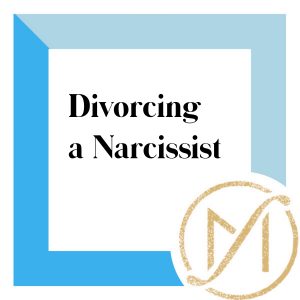Divorcing a Narcissist

When divorcing a narcissist, you will likely be very concerned about how a narcissist will handle — and impact — your divorce.
Dealing with a narcissist — whether you’re married, divorcing, or divorced — can take a toll. But there are strategies and professionals available to help you. We work with many clients with narcissistic exes and have written this article not only to share our experience on what to expect — but also how to handle it.
Narcissistic Personality Disorder & Divorce
First, a little background on narcissism. Narcissism is a spectrum ranging from narcissistic traits all the way to a formal diagnosis of Narcissistic Personality Disorder. There is a high incidence of Narcissistic Personality Disorder going undiagnosed. This is because narcissists rarely go to counseling. One of the traits of narcissists is that they have an exaggerated sense of self-importance and believe themselves superior to others — including experienced professionals. In other words, they think they know more than any counselor could tell them.
In the end, a formal diagnosis isn’t going to make a big difference in how you respond to someone with narcissistic traits versus someone with NPD. Even if your spouse has not been diagnosed with Narcissistic Personality Disorder, a spouse with narcissistic traits is often high-conflict during divorce and it’s important to work with a divorce attorney familiar with the associated issues.
Narcissistic Traits
Narcissists are often very charming at first. This often is very concerning for their spouses — leaving them to fear that divorce lawyers, judges, and other professionals will be “duped” by the narcissist.
The thing about narcissists is that, especially in the divorce context, soon it becomes obvious that they:
- lack empathy
- are self-absorbed
- can’t handle any personal feedback (though they sure can give it)
- make demands but don’t respond to requests
- feel entitled
- ask for favors
- feel victimized much of the time
- may become enraged when they feel treated unfairly (even when their own actions created the situation).
In other words, those with Narcissistic Personality Disorder or traits see themselves as very superior people and spend a lot of time insulting and demeaning those around them, including not only you but all professionals involved in the divorce. (This includes not only your lawyer, but also their own lawyer.)
Gaslighting & Divorce
One of the most frustrating things about divorcing a narcissist is gaslighting. Narcissists use gaslighting to attempt to gain power by manipulating others into questioning their own reality. Here are some of the ways gaslighting may show up — the narcissist may:
- tell blatant lies
- deny they ever said or did something (even when there is objective proof to the contrary)
- align people against you (so you don’t know who to trust or turn to)
- tell you that everyone else (your lawyer, your friends, family, a mental health professional) is a liar
The more you can mentally prepare for your spouse’s gaslighting, the less it will affect you.
Read: What to Expect When You’re Divorcing a Narcissist
Tips for Divorcing a Narcissistic Spouse
- First of all, if you ever feel threatened or scared — speak up. There are legal protections to put in place to help. For example, there are three types of restraining orders in Connecticut.
- High conflict people often try to destabilize and control your emotions through a variety of means including gaslighting, threats, and humiliation. Review “low conflict” traits, as they are the key to dealing with a high conflict spouse. Following them will help you play your own game and stay focused and in control despite your spouse’s efforts to suck you into their dynamic.
- Get as educated about high conflict people as you can. Freed Marcroft’s team of divorce attorneys have found The High Conflict Institute to be a particularly excellent resource. You’ll gain helpful perspective and insight that will be invaluable through your divorce (and going forward).
- Begin working with a mental health professional of your own so that you have a professional to help you navigate your emotions and learn how to respond to your ex.
- Engage legal counsel experienced in dealing with narcissistic, high conflict people. You want a lawyer who knows how to avoid taking your high conflict spouse’s bait — and who can help you refocus when your spouse’s behavior gets under your skin.
- Have a proactive legal strategy to get you towards your goals. Lawyers have tools to get you to the other side of a divorce with a high conflict person. For example, you can get ground rules and protections in place, including via court order.
Next Steps
When you’re divorcing a narcissist, it’s critical to remember that you can’t change them or make them recognize that they are a narcissist. However, you can always choose how you react and respond back to them. Your spouse owns their own behavior — don’t take it personally. Remember that behind the narcissist’s front of extreme confidence lies a very fragile self-esteem that’s vulnerable to the slightest criticism (real or imagined). Their anger and blaming you is about them, not you.
Our first step at Freed Marcroft, the Goals & Planning Conference, is designed to get to the heart of your problem and unveil your true goals. Then, we take those goals along with the facts of your case and analyze them so that we can present you with recommendations and options on how to move forward.








